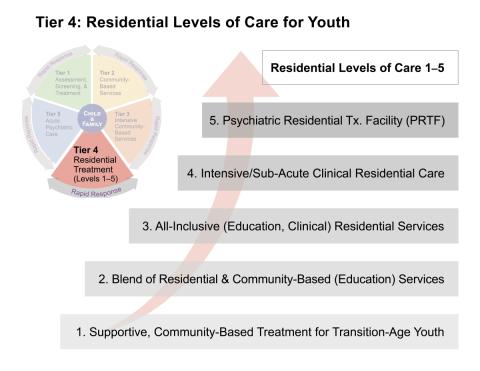
Research shows that most children or young people with mental health or substance use concerns do better when they stay in the community and receive treatment while remaining close to their family or caregivers. Still, there are times when a child or youth needs to go into a residential program to be safe and get the treatment they need.
Tier 4 services in New Hampshire’s System of Care includes a range of out-of-home, short-term (2-12 weeks) treatment programs designed for children and youth (ages 5-21) with significant mental health or substance use concerns that cannot be addressed at home. Short-term treatment outside of the home may be necessary when care in the community is not intensive enough or when the child and family are unsafe.
There are 5 levels of Residential Treatment:
Level 1: Youth in a level 1 treatment programs are typically of the age when they are working towards becoming more independent and aging out of the children’s service system. Youth in these programs are supported to create an individualized plan, obtain their high school diploma or equivalent, connect to a job or other career-related experiences, and connect to housing and other services in the community.
Level 2: Residential services at this level are provided 24 hours a day, 7 days a week, including a combination of targeted residential treatment and services in the community based on the individual's unique needs. Residents may engage in individual or group counseling in the facility or community, focused on their specific treatment needs, along with ensuring they continue to continue their education.
Level 3: Intensive Residential Treatment includes behavioral health treatment and educational programming provided in the facility to prepare the youth to go to a lower level of care.
Level 4: Intensive/Sub-Acute Clinical Residential Care provides treatment and support in a secure setting when the child or youth needs intensive, immediate, or specialty treatment in a residential setting.
Level 5: Psychiatric Residential Treatment (PRTF) is provided by Acres on the Hampstead Hospital grounds. East Acres is called a Psychiatric Residential Treatment Facility (PRTF) for children and youth, ages 5-17, who have severe emotional and/or behavioral challenges that require 24-hour care and therapy and meet eligibility criteria for PRTF level of care. East Acres provides trauma-informed psychiatric care, education, and 24/7 treatment and support to meet the individual needs of each child or youth.
All residential treatment programs have trained staff to provide proven treatments and programs and intensive clinical supervision. Residential treatment programs also provide case management and follow-up services after the child or youth leaves the program. Ask about the program’s services, support, routines, visitation schedules, and treatments.
If your child or youth needs residential treatment for a substance use disorder, the Doorway can be helpful: call 2-1-1 or visit The Doorway.
Transition Residential Care Coordination (TRECC)
The transitions between home and various levels of residential care can be very stressful and complicated. Transitional Residential Enhanced Care Coordination (TRECC) is designed to help you and your child or youth through the transitions between various levels of residential treatment and the transition back to the community. Transitional Enhanced Care Coordinators work for the Care Management Entities.
The TRECC Coordinator can help you if:
- Your youth or child is already in residential care and needs support to link that care to your goals.
- Your youth is in residential care and wants to go to a lower level of care or back home.
- You and your youth are considering residential treatment.
- You want to find the right place for residential treatment.
TRECC is provided by:
NH Care Management Entities (CMEs) for Enhanced Care Coordination:
What is the Process for Accessing Tier 4 Supports?
A Comprehensive Assessment for Treatment (CAT) must be completed before your child or youth will be considered for residential treatment. The CAT focuses on your child’s or youth’s strengths and needs, resulting in a rating for the level of care and setting (community or residential) best suited to your child and family situation. The CAT is conducted by trained staff who interview the caregivers, the youth (if appropriate), and other people in the youth’s support network. It takes about 30 days to complete and provides essential information about the level of care your child or youth needs and recommendations for your family and team to consider. Your family will receive a copy of the report.
The CAT is also conducted periodically while your child or youth is in treatment to measure progress and help guide their care.
If you feel your child or youth needs residential treatment, call or email the NH Bureau of Children’s Behavioral Health:
E-mail: BCBHInquiry@dhhs.nh.gov or Phone: 603-271-5000 to talk to a specialist about your situation.
If you are receiving behavioral health services, FAST Forward Wraparound, or DCYF services, you can talk to your case manager, therapist, or coordinator about a referral for residential treatment.
LEARN MORE ABOUT THE COMPREHENSIVE ASSESSMENT FOR TREATMENT
Additional Resources:
- State Residential Treatment for Behavioral Health Conditions: Regulation and Policy PDF
This policy report describes the requirements of residential treatment providers.
Target Audience: Providers

